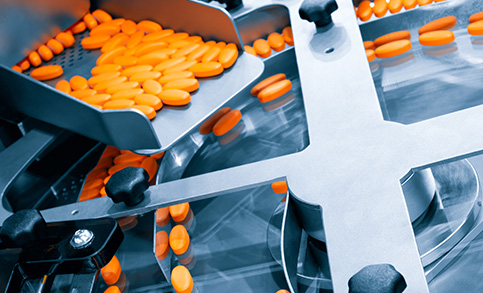Importance of quality pharmaceutical products has always been of great importance and the current pandemic has reiterated its need. To cater the pharmaceutical need of growing population, the industry needs advanced solutions to meet the demand while maintaining the product quality.
Effects of Uncontrolled Humidity
The quality of air is crucial in the pharmaceutical industry. Presence of moisture in the pharmaceutical plant can deteriorate the product quality, cause organic corrosion, biochemical reactions, germination of unwanted microorganisms, impair product accuracy and uniformity in formulations. Thus, moisture free air is essential at every stage of pharmaceutical process including processing, manufacturing, storage, research and testing, and packaging.
Processing
Powder Milling: Atmospheric moisture is the natural enemy of many grinding and pulverizing operations. The contact of water vapour with the product makes the material resilient, and therefore difficult to grind. The material clings to the grinding machine, and defies pneumatic conveying from one process to another.
Compounding of Tablets: Basic operation of chemical and pharmaceutical industries is the bringing together of the constituents, under precise conditions, to form compounds. Unwanted moisture may impede desired reactions or cause the formation of undesirable end products. Many diagnostic products used in medicine today involve radioactive material that must be mixed or compounded in a humidity controlled environment. Aspirin and many other complex diagnostic compounds are moisture reactive. This leads to poor product quality and shortened shelf life. Potential problems like retarded growth in organic cultures, the disintegration of tablets, decomposition of formulations, shorter shelf life, etc.
Tablet Compression: Many materials used in medicines have a physical affinity for moisture, resulting in lumping and caking of powder. Powdered material compressed into tablet form under high pressure will adhere only in the dry state. Humidity may cause the failure of the tableting process and in some cases, decompose the drug and lessen its medicinal value.
Tablet Coating: In the coating pan for tablets, heavy sugar solution is added to the tumbling mass. As the water evaporates, sugar crystals cover each piece. Blowing the proper quantity of air at the correct dry and wet bulb temperatures form a smooth and opaque coating. If the cooling and drying are not at the desired rate, the coating is rough, translucent and unsatisfactory in appearance. If the blowing is too fast, the coating chips go through to the interior.
Manufacturing
In effervescent tablets, excess moisture in the manufacturing area reacts with the tablets, making them stick to the machines and affecting their surface finish. Similarly, in cough drop syrups, the material sticks to the stamping machine when humidity is high.
Storage:
Aluminum is moisture sensitive in nature and can result in packing of moisture with the tablet.
Packaging
In dry powder and vial filling, moisture causes the powder to stick to the conveyor, preventing airveying and filling operation. Similarly, during strip packaging, the dehumidified airveying of hygroscopic chemicals from storage to processing areas becomes critical in the pharmaceutical industry. The final packaged material must maintain its validity during the expected shelf life. The product package must maintain the “as manufactured” moisture level, considering that air is packed with the product in the final step. Hence, it is necessary to surround the packaging area with dry air.
During injection manufacturing, injections are prepared under sterile conditions. Injections/ampoules need to be prepared with humidity level of 45% and sterile ampoule powders at 35% RH or lower. The processing of Dry Injection requires RH to be maintained at 15±5% and a temperature of 21ºC. The most critical operation in the above process is Filling and Sealing. The filling operation requires conveying of powder and filling the vials with the required amount precisely. The powder must be free flowing and should be dry enough to avoid any lump formation or stickiness.
Diagnostic Kit Manufacturing, Storage, and Packaging: Diagnostic test kits are one of the major demand drivers for moisture control solutions. The components used in rapid test kits are highly hygroscopic, tend to react with moisture and thereby may generate inaccurate test results. Thus, to ensure accurate test results, it is vital to provide recommended temperature and humidity level while assembling and manufacturing the Rapid Test Kits.
Nutraceuticals: Nutraceutical (essentially dietary supplements, medical and functional foods) are hygroscopic and require humidity control. Moist environment can yield inconsistent product and reduce production rate of nutraceutical. For example, Spirulina tablet is an example of nutraceutical, which is processed from its organic form (blue-green algae) into tablets under strict conditions of moisture control to maintain the desired quality.
Bry-Air Solution
Dehumidification or Moisture/ Humidity Control solutions are almost essential across all the various stages and processes of the Pharmaceutical Industry. From processing to manufacturing, storage, research and testing, packaging areas of the pharma industry, all require ideal RH conditions to be maintained. Hence, dehumidifiers become all the more important.
Bry-Air Desiccant dehumidifiers can maintain RH as low as 1% or even lower at constant level, regardless of ambient conditions during production, processing, storage and packaging. Bry-Air dehumidifiers are CNC fabricated with powder coated finish incorporating high performance Metal Silicate Fluted media, which is bacteria static, non-toxic and thus, ideal to meet GMP requirements of the pharmaceutical industry.













